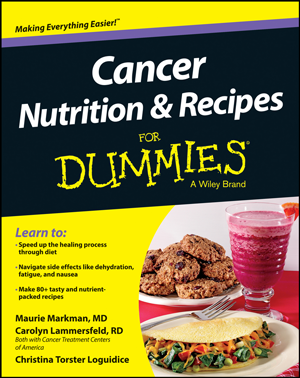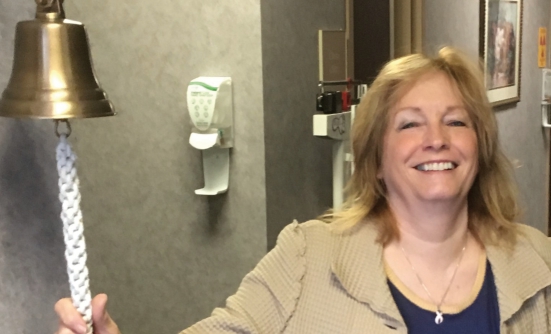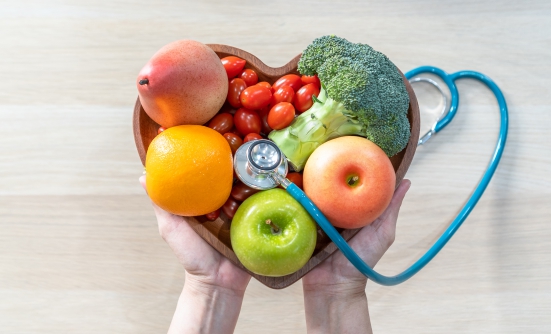Proper nutrition during cancer treatment can protect against loss of muscle and bone, promote better digestive health, help reduce side effects of treatment, and prevent malnutrition. This last point is extremely important, because up to 80% of patients with cancer receiving combined types of therapy—surgery, radiation, and chemotherapy—experience unintentional weight loss and malnutrition. Let us look at what malnutrition is, how to recognize the signs and symptoms, and tips on how to prevent malnutrition.
Malnutrition and Cancer
Simply stated, nutrition is the ability to properly ingest, digest, absorb, and metabolize nutrients that are important to our health and well-being. Cancer and cancer treatment can interfere with any or all of these steps, which can lead to malnutrition.
There are several types of malnutrition: both undernutrition and overnutrition are forms of malnutrition. Undernutrition is typically what people think of when they hear the word “malnutrition”—unintended weight loss caused by an insufficient amount of calories and protein in the body, resulting in muscle loss and loss of physical function.
Undernutrition is often found in patients with gastrointestinal cancer, lung cancer, head and neck cancer, and any type of advanced cancer. By contrast, overnutrition, or obesity, is the form of malnutrition that most people are shocked to learn is actually a sign of malnutrition. Obesity is associated with increased risk for 13 types of cancer and poor outcomes from cancer treatments. Whether a patient suffers from undernutrition or overnutrition, it can greatly compromise his or her quality of life.
Consequences of Malnutrition
Several studies have shown that patients with cancer who are malnourished may:
- Have worse health outcomes
- Have a higher risk of side effects from chemotherapy and radiation therapy
- Have more and longer hospitalizations
- Have an increased risk for surgical complications
- Have a higher cost of care
- Struggle with negative effects on their immune function, which increases their risk for infection
- Not be able to tolerate cancer treatment, which can delay or suspend their treatment entirely
Causes of Malnutrition
Malnutrition can result from different causes in patients with cancer, including:
- Side effects of treatment, such as mouth sores, difficulty swallowing, changes in taste, diarrhea, nausea
- Changes in digestion and/or metabolism because of the cancer, including blockage of the digestive tract due to a tumor, and/or compounds produced as a result of cancer that may lead to loss of appetite, muscle, and physical function
- Depression associated with a cancer diagnosis, which leads to a lack of motivation to eat
- Dietary changes in an unhealthy or unsupervised way (e.g., fad diets)
Recognizing Malnutrition
So how can you recognize if you are malnourished? The most obvious symptoms are unintentional weight loss or weight gain, or body composition changes (meaning that the weight remains the same, but the muscle mass is lost). Other signs of malnutrition are:
- Loss of physical function and strength
- Changes in the skin, hair, or nails (becoming weak and/or breaking easily)
- Changes in the oral cavity, such as inflammation and cracks on the sides of the mouth, or an inflamed tongue
- Signs of muscle loss, such as a squaring of the shoulders, and/or visible loss of muscle in the face
- Fatigue
Talk With Your Doctor or Care Team
If you are experiencing any of these symptoms, or believe you may be malnourished, it is important that you talk to your oncologist and/or registered dietitian about this. They will be able to review your treatment regimen, discuss your personal health goals, and design a nutrition and physical well-being plan that is best suited to your individual needs. Based on the severity of malnutrition, and the functioning of your digestive tract, you may be referred to receive nutrition through a feeding tube or intravenous feeding.
Knowing how widespread malnutrition is in patients with cancer, there are several ways that you can help to prevent or manage it.
Nutrition Tips for Patients and Survivors
- Always balance the quantity of food with quality. Eating a plant-based diet, with a focus on lean protein, is very important. However, if you do not consume enough “fuel,” your body will have to draw on its internal storage of protein from muscle. Try to incorporate healthy, high-calorie and/or protein-rich foods such as beans and bean spreads, nuts or nut butters, avocados and guacamole
- Eat 20 to 30 grams of protein 3 times a day to help with muscle health. A piece of fish the size of a deck of cards, or a single chicken breast, will provide this amount of protein
- Try eating smaller, more frequent meals until your appetite and weight improve. This will help you get the nutrients you need without the feeling that you overate, which is an especially difficult feeling to maneuver if you are nauseous or feel full easily
- Take advantage of your optimal time of day to eat, and never force yourself. For example, if your appetite is strongest at breakfast, eat more then. When you are able to eat, take your time, and chew slowly and thoroughly. Try to listen to relaxing music during meal times
- Consider incorporating liquid calories. Smoothies and homemade shakes can be fulfilling. Add protein powder to help meet your protein intake needs
- If you are struggling with fatigue, don’t be afraid to ask for help with grocery shopping and preparation. Take advantage of any offers you receive—know that your body is going through a lot right now, and a little help with simple errands or tasks can make a large difference
- If possible, get up and move around. Maintaining a healthy weight is important to help keep you strong throughout treatment. Light exercise, such as walking, is a great place to start, but always talk to your oncologist before starting an exercise regimen. In addition, activity can stimulate the appetite, and help maintain or rebuild muscle
- Drink plenty of fluids to avoid dehydration. As a general rule, try to drink 8 glasses of fluid each day. If water is unappealing, try substituting some of the glasses with broth, unsweetened juice, sports drinks, homemade smoothies and shakes, or ginger ale. Sucking on ice cubes throughout the day can also help. If you need to gain weight, fluids with calories may be more beneficial; otherwise, water, infused water, and unsweetened herbal teas are better choices
- Monitor your diet by keeping a food log or using an app. Record what you are eating and the portions, as well as how you feel at the time. This will allow you to see patterns in your eating, and help you determine where you can increase or decrease calories as needed. Sharing your log with your healthcare providers may also help them be able to give you additional tips, which will further help you meet your goals
- Be smart about selecting your supplements. Approximately 65% of patients take supplements during cancer treatment, but studies have shown that many patients do not share this information with their medical team. It is important to discuss all supplements with your oncologist and/or healthcare team, because many supplements may negatively interfere with the effect of cancer drugs. In addition, not all supplements are made with the highest quality of ingredients. Fish oil supplements may be beneficial for people with unintentional weight and muscle loss. Your healthcare team can also evaluate whether you are deficient in vitamins and/or minerals, or at risk for deficiencies and require supplements to improve your nutritional status
Knowledge Is Power
Just as every person is different, every cancer and cancer treatment journey is, too. The amount of calories, protein, and other nutrients needed to maintain muscle and stay strong differs from person to person.
When we are diagnosed with any illness, knowledge is power. Empower yourself by asking questions about your nutrition needs while going through cancer treatment and beyond. And if you are interested in doing your own research online, be sure to visit reputable websites, such as the American Cancer Society, National Institutes of Health, American Institute for Cancer Research, or the Oncology Nutrition Dietetic Practice Group.
Remember that your risk for malnutrition doesn’t end when your treatment ends. It is recommended that you maintain a healthy nutrition and exercise regimen after cancer treatment to continue supporting your immune system and your overall well-being.
About the Author

Ms. Lammersfeld is Vice President of Integrative Medicine at Cancer Treatment Centers of America. As a licensed and registered dietitian board certified in oncology nutrition, she has counseled patients with cancer on proper nutrition for more than 20 years.
She is also the co-author of Cancer Nutrition & Recipes for Dummies, which is focused on recipes, ingredients, and health tips that may help ward off illness and strengthen the body. This book helps to empower the patient with cancer through proper nutrition, an important area not to be overlooked while dealing with all other aspects of cancer. Follow her on Twitter at @CLammersfeld.
Key Points
- Malnutrition, whether overnutrition or under- nutrition, leads to many complications in patients with cancer
- Be very conscious of your diet, so you can prevent or manage malnutrition
- Share your diet with your medical team to gain valuable feedback and possibly make alterations
- Pay attention to any physical changes you experience throughout treatment, such as weight loss or gain, changes in your skin, hair, or nails
Patient Resources
American Cancer Society
www.cancer.org/healthy/eat-healthy-get-active
American Institute for Cancer Research
www.aicr.org/reduce-your-cancer-risk/diet
National Institutes of Health
www.nhlbi.nih.gov/health/health-topics/topics/dash
Oncology Nutrition Dietetic Practice Group
www.oncologynutrition.org












